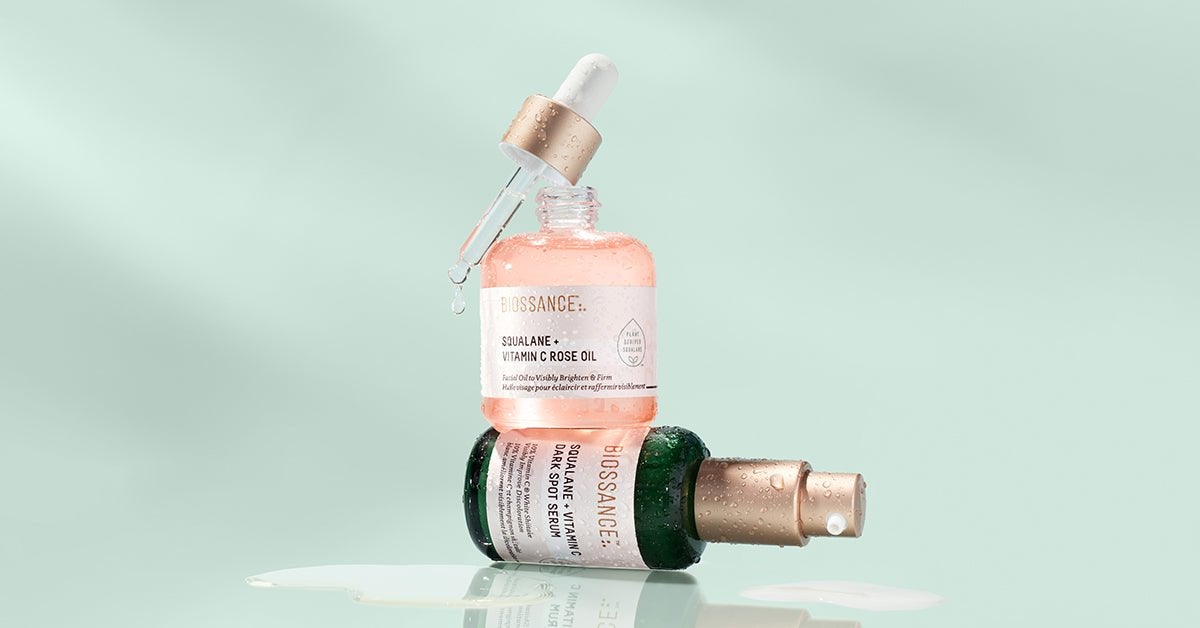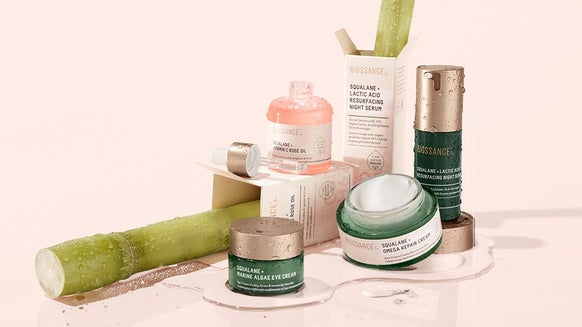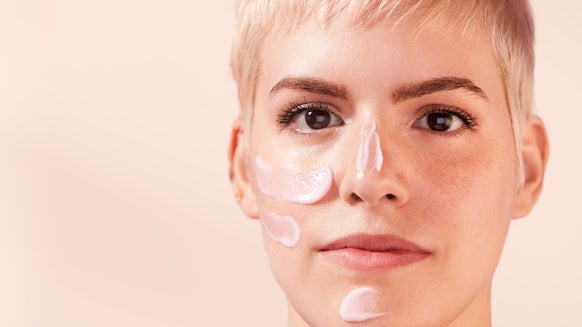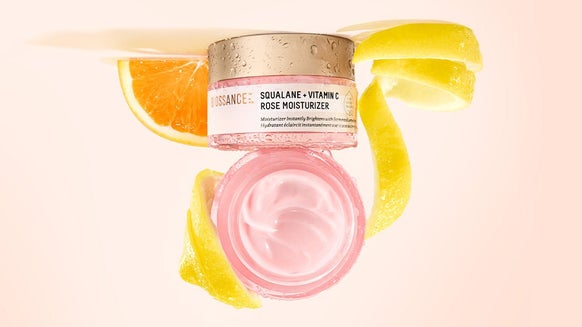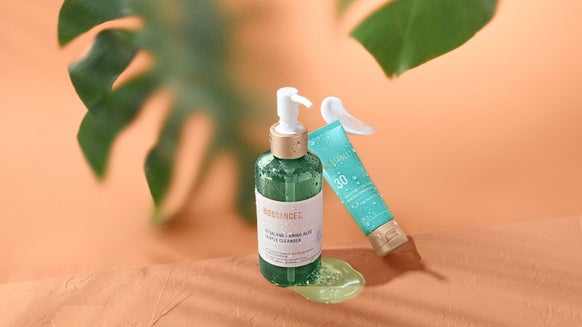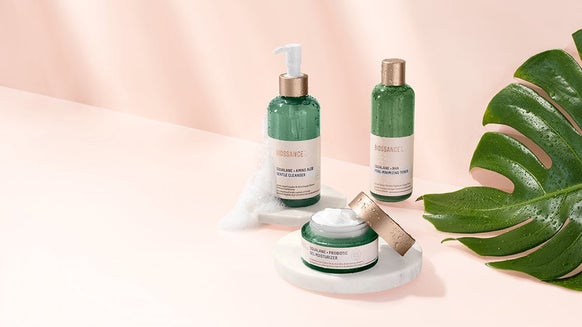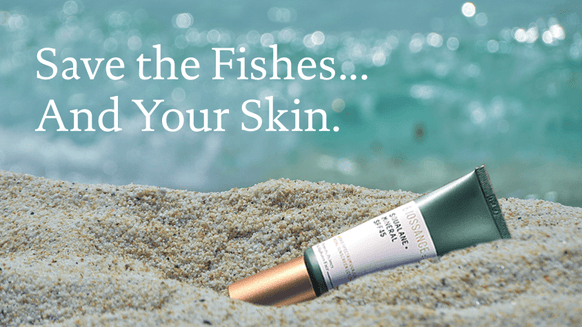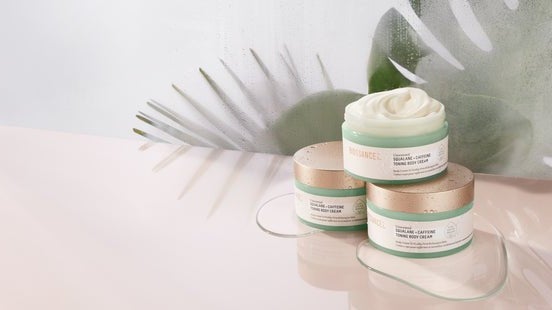If you have melanated skin and experience dark spots, then you’re not alone. Melanated skin can become sun damaged just like lighter skin tones, and can in fact be even more susceptible to post-inflammatory hyperpigmentation and hormonal melasma.Read on for an in-depth Q+A with Biossance Global Education Manager Alexis Udo-Udoma as she shares her expertise in improving the look of dark spots in dark skin.Q: It’s hard to talk about dark skin without mentioning the Fitzpatrick scale. What is it and how is it useful? The Fitzpatrick scale was designed to classify different skin complexions and their reactions to treatments and sun exposure. I being the lightest that always burns and never tans to VI being the deepest that rarely burns and tans quite easily and fast. The misconception here is that sun exposure doesn't affect skin that is higher on the Fitzpatrick scale because they don't visibly burn; therefore, they believe that their skin is not being affected or damaged by the sun. All skin can be damaged by the sun. This can look like a sunburn, pigmentation like dark spots, extra freckles or melasma, acceleration in fine lines and wrinkles, dehydration of the skin, roughness and change in skin texture. It can also look like skin cancer on the surface or underneath the surface of the skin. There are multiple ways our skin is affected by the sun outside of a superficial burn and therefore all skin complexions should apply and reapply SPF daily. Q: How is hyperpigmentation different for people who are higher on the Fitzpatrick scale? People with melanated skin have more pigment-producing skin cells called melanocytes. Sometimes, after internal or external changes these cells go into overdrive and produce too much pigment, causing dark patches on the skin called pigmentation. These dark spots can be caused by genetics, frequent sun exposure, post-inflammatory hyperpigmentation, irritating skin care products, and hormonal changes such as pregnancy.
In addition, melanated skin is often sensitive skin, as skin of color tends to have a different type of melanin with a greater inflammatory response than fairer skin complexions. Deeper skin complexions are more prone to injuries like scarring and dark spots, the results can take longer to heal and last for more than a few weeks.
Q: Is there any way to prevent dark spots on the face?Dark spots can be caused or exacerbated by sun exposure. Wearing a broad spectrum, reef-safe, 100 percent mineral sunscreen with an SPF of at least 30 every day is the best way to prevent it. This can be tricky, as many leave a white cast that’s especially noticeable on dark skin. I use our Squalane + Zinc Mineral Sunscreen every day. It completely blends after I rub it in and I love that it has aloe and squalane in it to soothe and hydrate.
I also suggest incorporating a Vitamin C product to help prevent future dark spots and improve the look of the ones you already have. Vitamin C is a powerful antioxidant that neutralizes the free radicals that cause dark spots.Our new Squalane + Vitamin C Rose Moisturizer is fantastic because it uses an ultra-stable and gentle form of Vitamin C that won’t irritate sensitive skin. It also includes a fermented lemon peel, a natural skin brightener. It provides antioxidant support to the skin by helping to even out tone and prevent signs of discoloration.
Q: What about alpha hydroxy acids? Can they also be preventative?Lactic Acid can also be beneficial, especially if you have oily skin like I do. It increases cell turnover while also moisturizing and balancing, making it a powerful - but gentle - alpha hydroxy acid. It may also benefit oily and blemish-prone skin by helping to reduce excess sebum, control acne-causing bacteria, unclog pores, reduce inflammation and may help acne medications penetrate better by exfoliating the topmost layer of skin. This all works to potentially prevent some of the skin concerns that cause dark spots in the first place.
Our Squalane + 10% Lactic Acid Resurfacing Night Serum is awesome because it’s powerfully effective, but also super gentle. Our formula includes sugarcane-derived squalane, which provides additional hydration to help prevent irritation.
Q: How can you lessen the appearance of dark spots you already have?Retinoids are Vitamin A derivatives beloved by dermatologists for their ability to reduce the look of dark spots as well as fine lines and wrinkles. Our Squalane + Retinol Night Serum includes two powerful retinoids: retinol, which is historically best in class for improving skin tone and texture, and retinaldehyde, the most powerful – and the gentlest – retinoid available without a prescription.
I also like our Squalane + 10% Lactic Acid Overnight Resurfacing Serum for improving the look of dark spots. Like Vitamin C and retinol, it increases cell turnover, reducing the appearance of dark spots and making the skin brighter and healthier. Lactic acid can also help other active ingredients work better by helping them penetrate more deeply. I recommend using our Squalane + Vitamin C Rose Moisturizer on top of our lactic acid serum at night for maximum efficacy.
If you’re looking for a daytime treatment, our Squalane + Vitamin C Dark Spot Serum contains White Shitake Mushroom to powerfully target the look of existing dark spots. You can layer it with our Squalane + Vitamin C Rose Moisturizer and Squalane + Vitamin C Rose Oil - both of which include an ultra-stable, oil-soluble form of Vitamin C called THD - to further improve the look of uneven skin tone while giving you a lit-from-within glow.
Q: A lot of people shy away from retinol because they’re worried it will irritate their skin. How is our Squalane + Retinol Night Serum different?Our retinoids are encapsulated using innovative, time-release technology. Instead of flooding your skin with retinoids all at once, our Squalane + Retinol Night Serum releases our powerful retinoid blend gradually over 8 hours while our superhero hydrator, squalane, provides soothing hydration and drives them deeper into the skin for maximum efficacy.
Our formula also includes a blend of soothing antioxidants, which further work to minimize irritation while supporting overall skin health.Q: Can I use all of these ingredients together?Yes, but not at the same time. Here are my favorite layered skincare routines for targeting dark spots both day and night:Morning Skincare Routine For Improving The Look Of Dark Spots
Step 1: Cleanse with our Squalane + Antioxidant Cleansing Oil to nourish and hydrate while removing every trace of dirt and makeup.
Step 2: Spritz your skin with our Squalane + Hyaluronic Acid Facial Mist to boost hydration and help active ingredients penetrate more deeply.
Step 3: Massage your skin with a dropper full of our Squalane + Vitamin C Dark Spot Serum to powerfully target and improve the look of dark spots while delivering all-day hydration.
Step 4: Apply our new Squalane + Vitamin C Rose Moisturizer to hydrate while powerfully brightening and reducing the appearance of fine lines, wrinkles, and dark spots.
Step 5: Protect and hydrate with our Squalane + Zinc Mineral Sunscreen for all-day SPF 30 PA +++ protection.
Evening Skincare Routine For Improving The Look Of Dark Spots
This routine includes instructions for using retinol and lactic acid on alternate nights, which can maximize the benefits of both ingredients. I want to stress that you shouldn’t use both ingredients on the same night, and also mention that you may want to incorporate rest days - as in a skin cycling routine - if you have sensitive skin or are just starting to use retinol.
Step 1: Double cleanse with our Squalane + Antioxidant Cleansing Oil and our Squalane + Amino Aloe Gentle Cleanser to deeply clean pores and remove remnants of environmental pollution without overstripping.
Step 2: Spritz with Squalane + Hyaluronic Acid Facial Mist to hydrate and prep skin.
Step 3 (NIGHT 1): Gently - but powerfully - reduce the look of fine lines, wrinkles, and dark spots with our Squalane + Retinol Overnight Serum.
Step 3 (NIGHT 2): Dramatically retexturize while improving the look of dark spots with our Squalane + 10% Lactic Acid Overnight Resurfacing Night Serum.
Step 4: Deeply hydrate and nourish with ourSqualane + Vitamin C Rose Moisturizer
Step 5: Seal in moisture and take radiance to the next level with our award-winning Squalane + Vitamin C Rose Oil.
